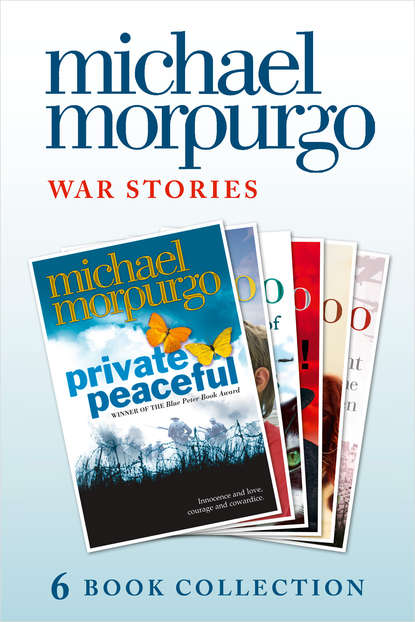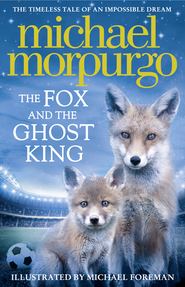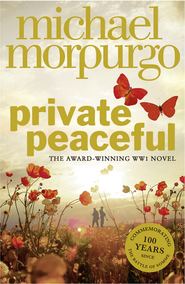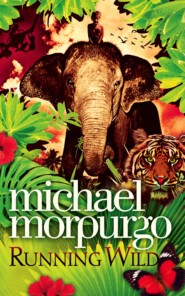По всем вопросам обращайтесь на: info@litportal.ru
(©) 2003-2025.
✖
Morpurgo War Stories
Настройки чтения
Размер шрифта
Высота строк
Поля
“Then dig, you lazy beggars, dig, ‘cos when you get out there, that’s all you’ve got to hide in, God’s good earth. And when them whizzbangs come over I’m telling you you’ll always wish you’d dug deeper. The deeper you dig the longer you’ll live. I know, I’ve been there.”
No matter what the officers and NCOs told us of the hardships and dangers of trench warfare, we still all believed we were simply in some kind of rehearsal, actors in costume. We had to play our part, dress our part, but in the end it would only be a play. That was what we tried to believe — if ever we spoke about it, that is. But the truth was that we didn’t speak of it much. I think we didn’t dare because deep down we all knew and we all trembled, and were trying to deny it or disguise it or both.
I remember we were on exercise in the hills, lying there on our backs in the sunshine one morning when Pete sat up suddenly. “Hear that?” he said. “It’s guns, from over in France, real guns.” We sat up and listened. We heard it. Some said it was distant thunder. But we heard it all right. We saw the sudden fear in each other’s eyes and knew it for what it was.
But that same afternoon we were back to play-acting, war games in full pack, attacking some distant “enemy” copse. When the whistles blew we climbed out of our trenches and walked forward, bayonets fixed. Then on a bellowed command we threw ourselves face down and crawled on through the long grass. The ground under us was still warm with summer, and there were buttercups. I thought of Molly then and Charlie and the buttercups in the water meadows back home. A bee, heavy with pollen and still greedy for more, clover-hopped in front of me as I crawled. I remember I spoke to him. “We’re much alike, bee, you and me,” I said. “You may carry your pack underneath you and your rifle may stick out of your bottom. But you and me, bee, are much alike.” The bee must have taken offence at this, because he took off and flew away. I lay where I was, propped up on my elbows, and watched him go, until my thoughts were rudely interrupted by the corporal.
“What d’you think you’re on, Peaceful, a bloody picnic? On your feet!”
In those first few weeks in uniform I hardly had time to miss anyone, not even Molly, though I thought of her often, and Mother and Big Joe. But they were only ever fleeting thoughts. Charlie and I rarely talked of home — we were hardly ever alone together anyway. We’d even stopped cursing the Colonel by now. There didn’t seem any point, not any more. It was a hateful thing he’d done, but it was a done thing. We were soldiers now, and it wasn’t bad, so far. In fact, despite all the lining up and the bellowing, it was turning out to be a lark, a real lark. Charlie and I wrote cheery letters home — most of his were to Molly, all of mine to Mother and Big Joe. We read them aloud to each other, those bits we wanted to share anyway. We weren’t allowed to say where we were or anything about the training, but we always found plenty to tell them, plenty to brag about, plenty to ask about. We told them the truth, that we were having a good time — eating well and being good — mostly. But the moment we got on the ship for France the good times ended. Little Les James said he smelled a storm in the air, and as usual he was right.
There wasn’t a man on board that ship that didn’t want to die before he ever got to France. Most of us, Charlie and me included, had never seen the sea before, much less the heaving grey waves of the English Channel, and we lurched about the deck like drunken ghosts longing only to be released from our agony. Charlie and I were vomiting over the side when a seaman came up to us, clapped us heartily on the back and told us that if we were going to die we’d feel much better doing it down below in the hold with the horses. So Charlie and I staggered down the gangways until we found ourselves deep in the bowels of the ship and in amongst the terrified horses, who seemed happy to have someone for company as we crawled in and curled up in their straw, too close to their hooves for safety, but feeling too ill to care. The seaman was right. Down here the ship seemed to roll much less, and despite the stifling stench of oil and horse dung we began to feel better almost at once.
When at long last the engines finally stopped we went up on deck and looked out at France for the first time. The French gull that hovered overhead eyeing me with deep suspicion looked much like every gull I’d seen following the plough back at home. Every voice I heard on the quayside below was English. Every uniform and every helmet was like our own. Then, as we came down the gangplank into the fresh morning air, we saw them, the lines of walking wounded shuffling along the quay towards us, some with their eyes bandaged, holding on to the shoulder of the one in front. Others lay on stretchers. One of them, puffing on a cigarette between pale parched lips, looked up at me out of sunken yellow eyes. “G’luck lads,” he cried as we passed. “Give ‘em what for.” The rest stayed silent and their staring silence spoke to each of us as we formed up and marched out of town. We all knew then that the larking and the play-acting were over. From that moment none of us doubted the seriousness of what this would be about. It was our lives we would be acting out over here, and for many of us, our deaths.
If any of us had any last lingering delusions then they were very soon dispelled by our first sight of the vast training camp at Etaples. The camp stretched away as far as the eye could see, a tented city, and everywhere I looked there were soldiers drilling — marching, doubling, crawling, wheeling, saluting, presenting arms. I had never in my life seen such a bustle of people, never heard such a racket of humanity. The air echoed with the din of barked orders and shrieked obscenities. That was when we first came across Sergeant Horrible Hanley, our chief scourge and tormentor over the coming weeks, who was to do his utmost to make all our lives a misery.
From the moment we saw him most of us lived in dread of him. He was not a big man, but he had eyes of steel that bore into us, and a lashing snarl in his voice that terrified us. We just buckled under and did what he wanted us to. It was the only way to survive. However much he doubled us up hills with stones in our packs, however much he made us throw ourselves down in the freezing mud and crawl through it, we did it, and with a will, too. We knew that anything less — to protest, to complain, to talk back, even to look him in the eye — would be to draw down upon us even more fury, even more pain, even more punishment. We knew because we saw what happened to Charlie. Charlie wouldn’t even go along with his little jokes. It was this that got him into trouble in the first place.
It was a Sunday morning and we were being inspected before a church parade when Sergeant Hanley found fault with Charlie’s cap badge. He said it was crooked. Nose to nose, Hanley bellowed into Charlie’s face. I was in the rank behind Charlie, but even there I could feel the spray from Hanley’s spittle. “You know what you are? You’re a blot on Creation, Peaceful. What are you?”
Charlie thought for a moment and then replied in a clear, firm voice, and utterly without fear: “Happy to be here, Sergeant.”
Hanley looked taken aback. We all knew the answer Hanley was looking for. He asked again. “You’re a blot on Creation. What are you?”
“Like I said, Sergeant, happy to be here.” Charlie just would not give Hanley the satisfaction of playing his game, no matter how often Hanley asked, nor how loud he shouted. For that Charlie was put on extra sentry duty, so that night after night Charlie hardly got any sleep. Hanley never let up after that, never missed an opportunity to pick on Charlie and punish him.
There were some in the company who didn’t at all like what Charlie was doing, Pete amongst them. He said Charlie was stirring Hanley up unnecessarily, and was making things difficult for the rest of us. I’ve got to say I half agreed with them — though I didn’t tell them that, and I certainly didn’t tell Charlie. It was quite true that Hanley was giving our company in particular a lot of grief, and it was obvious this was because he had a vendetta against Charlie. Charlie was swiping at the wasp, and the wasp wasn’t just stinging him, he was stinging all of us. Charlie was beginning to be thought of as a bit of a liability in the company, a bit of a Jonah. No one said as much to him — they all liked and respected Charlie too much — but Pete and Little Les and Nipper Martin did come to me on the quiet, and asked me to talk to him. I tried as best I could to warn Charlie. “He’s like Mr Munnings back at school, Charlie. Our lord and master, remember? Hanley’s our lord and master out here. You can’t fight him.”
“But that doesn’t mean I have to lie down and let him walk all over me,” he said. “I’ll be all right, you’ll see. You look after yourself. You watch your back. He’s got his eye on you, Tommo, I’ve seen him.” That was typical Charlie. I was trying to warn him, and he just turned the whole thing around and ended up warning me.
It was a little enough thing that sparked it off, a dirty rifle barrel. Thinking back now I know for sure Hanley must have done it quite deliberately, to provoke Charlie. Everyone knew by now that I was Charlie’s younger brother, and a year too young to enlist. We’d long ago given up the pretence of being twins. After we’d first met up with Pete and Little Les and Nipper from home, we’d had to come clean about it, and by then it didn’t much matter. There were dozens of others underage in the regiment and everyone knew it. After all, they needed all the men they could get. The other lads teased me about it, about having a chin like a baby’s bottom and about my not needing to shave, which wasn’t true, and about my squeaky voice, too. But they all knew that Charlie was looking out for me. If ever the teasing got a bit out of hand, Charlie would give them a little look and it would stop. He never nannied me, but everyone knew he’d stick by me no matter what.
Hanley was nasty but he wasn’t stupid. He must have sensed it too, and that was why he began picking on me as well. I’d had plenty of practice at putting up with this kind of thing back at school with Mr Munnings, but Horrible Hanley was a tormentor in a class of his own. He found excuse after excuse to pick on me and punish me. Worn down by extra drills and sentry duty, I was very soon exhausted. The more exhausted I became the more mistakes I made, and the more mistakes I made, the more Hanley punished me.
We’d been drilling one morning, and were stood to attention in three ranks, when he grabbed my rifle. Looking down the barrel, Hanley pronounced it “dirty”. I knew the punishment, we all did: five times doubling around the parade ground holding your rifle above your head. After only two circuits I just could not keep my rifle up there any more. My arms buckled at the elbows, and Hanley bellowed at me: “Every time you let that rifle fall, Peaceful, you begin the punishment again. Five more, Peaceful.”
My head was swimming. I was staggering now, not running, and barely able to keep upright. My back was on fire with pain. I simply hadn’t the strength to lift the rifle above my head at all. I remember hearing a shout, knowing it was Charlie, and wondering why he was shouting. Then I passed out. When I woke in my tent they told me what had happened. Charlie had broken ranks and run at Hanley, screaming at him. He hadn’t actually hit him, but he had stood there nose to nose with Hanley telling him exactly what he thought of him. They said it was magnificent, that everyone cheered when he’d finished. But Charlie had been marched off to the guardroom under arrest.
The next day, in heavy rain, the whole battalion was paraded to witness Charlie’s punishment. He was brought out and lashed to a gun wheel. Field Punishment Number One, they called it. The brigadier in command sat high on his horse and said that this should be a warning to all of us, that Private Peaceful had got off lightly, that insubordination in time of war could be seen as mutiny and that mutiny was punishable by death, by the firing squad. All day long Charlie was lashed there in the rain, legs apart, arms spread-eagled. As we marched past him, Charlie smiled at me. I tried to smile back, but no smile came, only tears. He seemed to me like Jesus hanging on the cross in the church back home in Iddesleigh. And I thought then of the hymn we used to sing in Sunday school, What a friend we have in Jesus, and sang it to myself only to banish my tears as I marched. I remembered Molly singing it down in the orchard when we buried Big Joe’s mouse, and as I remembered I found myself involuntarily changing the words, changing Jesus into Charlie. I sang it to myself under my breath as we were marched away. “What a friend I have in Charlie.”
(#ulink_818af0f9-7380-5638-a7f2-ef54bf7911e1)
I dropped off to sleep. I’ve lost precious minutes — I don’t know how many, but they are minutes I can never have back. I should be able by now to fight off sleep. I’ve done it often enough on lookout in the trenches, but then I had cold or fear or both as my wakeful companions. I long for that moment of surrender to sleep, just to drift away into the warmth of nothingness. Resist it, Tommo, resist it. After this night is over, then you can drift away, then you can sleep for ever, for nothing will ever matter again. Sing Oranges and Lemons. Go on. Sing it. Sing it like Big Joe does, over and over again. That’ll keep you awake.
Oranges and Lemons, say the bells of St. Clements, You owe me five farthings, say the bells of St. Martins. When will you pay me? say the bells of Old Bailey. When I grow rich, say the bells of Shoreditch. When will that be? say the bells of Stepney. I’m sure I don’t know, says the great bell at Bow. Here comes a candle to light you to bed, And here comes a chopper to chop off your head.
They tell us we’re going up to the front, and we’re all relieved. We are leaving Etaples and Sergeant Hanley for ever, we hope. We’re leaving France and marching into Belgium, singing as we go. Captain Wilkes likes us to sing. Good for morale, he says, and he’s right too. The more we sing the more cheery we become, and that’s in spite of all we see — the shell-shattered villages we march through, the field hospitals we pass, the empty coffins waiting. The captain was a choirmaster and a teacher back home in Salisbury, so he knows what he’s doing. We hope he’ll know what he’s doing when we get to the trenches. It’s difficult to believe he and Sergeant Horrible Hanley are in the same army, on the same side. We have never come across anyone who treats us with such kindness and consideration. As Charlie says, “he treats us right”. So we treat him right too, except that is for Nipper Martin who ribs him whenever he can. Nipper can be like that, a bit mean sometimes. He’s the only one who still keeps on about my squeaky voice.
“Are we downhearted? No! Then let your voices ring and altogether sing: are we downhearted? No.” We sing out and march with a new spring in our step. And when that finishes and there’s just the sound of marching feet Charlie starts up with Oranges and Lemons, which makes us all laugh, the captain too. I join in and soon they’re all singing along. No one knows why we sing it of course. It’s a secret between Charlie and me, and I know as we sing that he’s thinking of Big Joe and home as I am.
The captain has told us we’re going to a sector that’s been quiet for a while now, that things shouldn’t be too bad. We’re happy about that of course, but we honestly don’t care that much. Nothing could be worse than what we’ve just left. We pass a battery of heavy guns, the gunners sitting round a table playing cards. The guns are silent now, their barrels gaping at the enemy. I look where they point but can see no enemy. All I have seen of our enemy so far is a huddle of ragged prisoners sheltering from the rain under a tree as we marched past, their grey uniforms caked in mud. Some of them were smiling. One of them even waved and called out. “Hello, Tommy.”
“He’s talking to you,” said Charlie laughing. So I waved back. They seemed much like us, only dirtier.
Two aeroplanes circle like buzzards in the distance. As they come closer I see they are not circling at all, but chasing one another. They are still too far away for us to see which of them is ours. We make up our minds it is the smaller one and cheer for him madly, and I’m wondering suddenly if the pilot from the yellow plane that landed in the water meadows that day might be up there in our plane. I can almost taste the humbugs he gave us as I watch them. I lose them in the sun, and then the smaller one spirals earthwards and our cheering is instantly silenced.
At rest camp they give us our first letters. Charlie and I lie in our tent and read them over and over again, till we know them almost by heart. We’ve both had letters from Mother and Molly, and Big Joe’s put his mark at the bottom of each one, his smudged thumbprint in ink with “Joe” written large beside it in heavily indented pencil. That makes us smile. I can see him writing it, nose to the paper, tongue between his teeth. Mother writes that they’re turning most of the Big House into a hospital for officers, and the Wolfwoman rules the roost up there more than ever. Molly says the Wolfwoman now wears a lady’s wide-brimmed straw hat with a big white ostrich feather instead of her old black bonnet, and that she smiles all the time “like Lady Muck”. Molly writes, too, that she’s missing me, and that she is well, except that she feels a little sick sometimes. She hopes the war will be over quickly and then we can all be together again. I can’t read the rest, or her name, because Joe’s finger has blotted everything else out.
They let us out of camp for an evening and we go into the nearest village, Poperinghe, “Pop” everyone seems to call it. Captain Wilkes tells us there’s an estaminet there — that’s a sort of pub he says, where you can drink the best beer outside England and eat the best egg and chips in the entire world. He’s right. Pete, and Nipper, Little Les, Charlie and me stuff ourselves on egg and chips and beer. We’re like camels filling up at an oasis that we’ve discovered by accident and may never find again.
There’s a girl in the restaurant who smiles at me when she clears the plates away. She’s the daughter of the owner who is always very smartly dressed and very round and very merry, like a Father Christmas without the beard. It’s difficult to believe she’s his daughter, for in every way she’s the opposite, wonderfully elf-like and delicate. Nipper notices her smiling at me and makes something dirty of it. She knows it and moves away. But I don’t forget her smile, nor the egg and chips and the beer. Charlie and me drink to the Colonel and the Wolfwoman again and again, wishing them all the misfortune and misery and all the little monster children they so richly deserve, and then we stagger back to camp. I’m properly drunk for the first time in my life, and feel very proud of myself, until I lie down and my head swirls and threatens to drag me down into some black abyss where I fear to go. I struggle to think straight, to picture the girl in the estaminet in Pop. But the more I think of her the more I see Molly.
The big guns bring me to my senses. We crawl out of our tent into the night. The sky is lit up all along the horizon. Whoever is underneath all that, friend or foe, is taking a terrible pounding. “That’s Ypres,” says the captain beside me in the darkness.
“Poor beggars,” says someone else. “Glad we’re not in Wipers tonight.”
We go back to our tent, huddle under our blankets and thank God it’s not us, but every one of us knows our time must come, and soon.
The next evening we go up into the line. There are no big guns tonight, but rifle fire and machine-gun fire crackle and rattle ahead of us, and flares go up, intermittently lighting the darkness. We know we are close now. It seems as if the road is taking us down into the earth itself, until it is a road no more but rather a tunnel without a roof, a communications trench. We have to be silent now. Not a whisper, not a word. If the German machine gunners or mortars spot us, and there are places they can, then we’re done for. So we stifle our curses as we slither and slide in the mud, holding on to one another to stop ourselves falling. A line of soldiers passes us coming the other way, dark-eyed men, sullen and weary. No need for questions. No need for answers. The haunted, hunted look in their eyes tells it all.
We find our dugout at last, every one of us yearning only for sleep now. It has been a long, cold march. A mug of hot sweet tea and to lie down, it’s all I want. But with Charlie, I’m posted to sentry duty. For the first time I look out through the wire over no-man’s-land and towards the enemy trenches, less than two hundred yards from our front line, they tell us, but we can’t see them, only the wire. The night is still now. A machine gun stutters and instantly I duck down. I needn’t have bothered. It’s one of ours. I’m overwhelmed by fear, numbed by it, and for the moment that fear banishes the wretched discomfort of my wet feet and frozen hands. I feel Charlie there beside me. “Fine night for poaching, Tommo,” he whispers. I can see his smile in the dark and my fear is gone at once.
It’s just as the captain said it would be, quiet. Every day I wait for the Germans to shell us, and they don’t. It seems they’re too busy shelling Wipers further up the line to bother about us, and I can’t say I’m sorry. I even begin to hope that they might have run out of shells. Every time I look through the periscope I expect to see the grey hordes coming at us across no-man’s-land, but no one comes. I am almost disappointed. We hear occasional sniper fire, so there is no smoking in the trenches at night, “unless you want your head shot off,” the captain says. Our artillery lobs a shell or two over into their trenches once in a while, and they do the same. Each one, theirs or ours — and ours sometimes drop short — comes as a surprise and terrifies me at first, terrifies all of us, but in time we become used to it and pay less attention.
Our trench and our dugouts have been left in a mess by the previous occupants, a company of Jocks from the Seaforths, so when we’re not on stand-to at dawn, brewing up or sleeping, we’re set to clearing up their mess. Captain Wilkes — or “Wilkie” as we call him now — is meticulous about tidiness and cleanliness, “because of the rats,” he says. We find out soon enough he’s right again. I am the first to find them. I am detailed to begin shoring up a dilapidated trench wall. I plunge my shovel in and open up an entire nest of them. They come pouring out, skittering away over my boots. I recoil in horror for a moment and then set about stamping them to death in the mud. I don’t kill a single one, and we see them everywhere after that. Fortunately we have Little Les, our own professional rat-catcher, who is now called upon whenever a rat is spotted, whatever the time, day or night, he doesn’t mind. He jokes that it makes him feel at home. He knows the ways of rats, and kills with a will each time, tossing their corpses up into no-man’s-land with a flourish of triumph. After a while the rats seem to know they have met their match in Little Les and leave us be.
But our other daily curse, lice, we all have to deal with ourselves. Each of us has to burn off his own with a lighted cigarette end. They inhabit us wherever they can, the folds of our skin, the creases of our clothes. We long for a bath to drown the lot of them, but above all we long to be warm again and dry.
Our greatest scourge is neither rats nor fleas but the unending drenching rain, which runs like a stream along the bottom of our trench, turning it into nothing but a mud-filled ditch, a stinking gooey mud that seems to want to hold us and then suck us down and drown us. I have not had dry feet since I got here. I go to sleep wet. I wake up wet, and the cold soaks through my sodden clothes and into my aching bones. Only sleep brings any real relief, sleep and food. God, how we long for both. Wilkie moves among us at dawn on the firestep, a word here, a smile there. He keeps us going, keeps us up to the mark. If he has fear he never shows it, and if that is courage then we’re beginning to catch it.
But we couldn’t do without Charlie either. It’s Charlie who keeps us together, breaks up our squabbles (which are many and frequent now that we are so closely confined together) and jollies each of us along when we get downhearted. He’s become like a big brother to everyone. After Sergeant Hanley and the field punishment, and the way Charlie managed to smile through it all, there isn’t a man in the company who doesn’t look up to him. Being his real brother I could feel I live in his shadow, but I never have and I do not now. I live in his glow.
We have a few more miserable days in the line, all of us longing for the comforts of rest camp. But when we get there they keep us endlessly busy. We clean our kit, march up and down, turn out for inspections again and again, do our gas mask drill again, and then there are always more ditches and drains to dig to take away the incessant rain. But we do have letters from home, from Molly and Mother, and they have knitted woollen scarves and gloves and socks for us both. We have communal baths in great steaming vats in a barn down the road and, best of all, eggs and chips and beer at the estaminet in Pop. The beautiful girl with the doe eyes is there, but she does not always notice me, and when she doesn’t I drink even more, to drown my sorrows.
The first snow of winter sees us back in the trenches. It freezes as it falls, hardening the mud — and that certainly is a blessing. Providing there is no wind we are no colder than we were before and can at least keep our feet dry. The guns have stayed relatively silent in our sector and we have had few casualties so far: one wounded by a sniper, two in hospital with pneumonia, and one with chronic trench foot — which affects us all. From what we hear and read we are in just about the luckiest sector we could be.
Word has come down from Headquarters, Wilkie says, that we must send out patrols to find out what regiments have come into the line opposite us and in what strength — though why we have to do that we do not know. There are spotter planes doing that almost every day. So most nights now, four or five of us are picked, and a patrol goes out into no-man’s-land to find out what they can. More often than not they find out nothing. No one likes going, of course, but nobody’s been hurt so far, and you get a double rum ration before you go and everyone wants that.
My turn soon comes up as it was bound to. I’m not particularly worried. Charlie’s going with me, and Nipper Martin, Little Les and Pete — “the whole skittle team”, Charlie calls us. Wilkie’s heading the patrol and we’re glad of that. He tells us we have to achieve what the other patrols have not. We have to bring back one prisoner for questioning. They give us each a double rum ration, and I’m warmed instantly to the roots of my hair, to the toes of my feet.
“Stay close, Tommo,” Charlie whispers, and then we are climbing out over the top, crawling on our bellies through the wire. We snake our way forward. We slither into a shell hole and lie doggo there for a while in case we’ve been heard. We can hear Fritz talking now, and laughing. There’s the sound of a gramophone playing — I’ve heard all this before on lookout, but distantly. We’re close now, very close, and I should be scared witless. Strangely, I find I’m not so much frightened as excited. Maybe it’s the rum. I’m out poaching again, that’s what it feels like. I’m tensed for danger. I’m ready for it, but not frightened.
It takes an eternity to cross no–man’s–land. I begin to wonder if we’ll ever find their trenches at all. Then we see their wire up ahead. We wriggle through a gap, and still undetected we drop down into their trench. It looks deserted, but we know it can’t be. We can still hear the voices and the music. I notice the trench is much deeper than ours, wider too and altogether more solidly constructed. I grip my rifle tighter and follow Charlie along the trench, bent double like everyone else. We’re trying not to, but we’re making too much noise. I can’t understand why no one has heard us. Where are their sentries, for God’s sake? Up ahead I can see Wilkie waving us on with his revolver. There is a flickering of light now coming from a dugout ahead, where the voices are, where the music is. From the sound of it there could be half a dozen men in there at least. We only need one prisoner. How are we going to manage half a dozen of them?
At that moment the light floods into the trench as the dugout curtain opens. A soldier comes out shrugging on his coat, the curtain closing behind him. He is alone, just what we are after. He doesn’t seem to see us right away. Then he does. For a split second the Hun does nothing and neither do we. We just stand and look at one another. He could so easily have done what he should have done, just put up his hands and come with us. Instead he lets out a shriek and turns, blundering through the curtain back into the dugout. I don’t know who threw the grenade in after him, but there is a blast that throws me back against the trench wall. I sit there stunned. There is screaming and firing from inside the dugout, then silence. The music has stopped.
By the time I get in there Little Les is lying on his side shot through the head, his eyes staring at me. He looks so surprised. Several Germans are sprawled across their dugout, all still, all dead — except one. He stands there naked, blood spattered and shaking. I too am shaking. He has his hands in the air and is whimpering. Wilkie throws a coat over him and Pete bundles him out of the dugout. Frantic now to get back we scrabble our way up out of the trench, the Hun still whimpering. He is beside himself with terror. Pete is shouting at him to stop, but he’s only making it worse. We follow the captain through the German wire and run.











